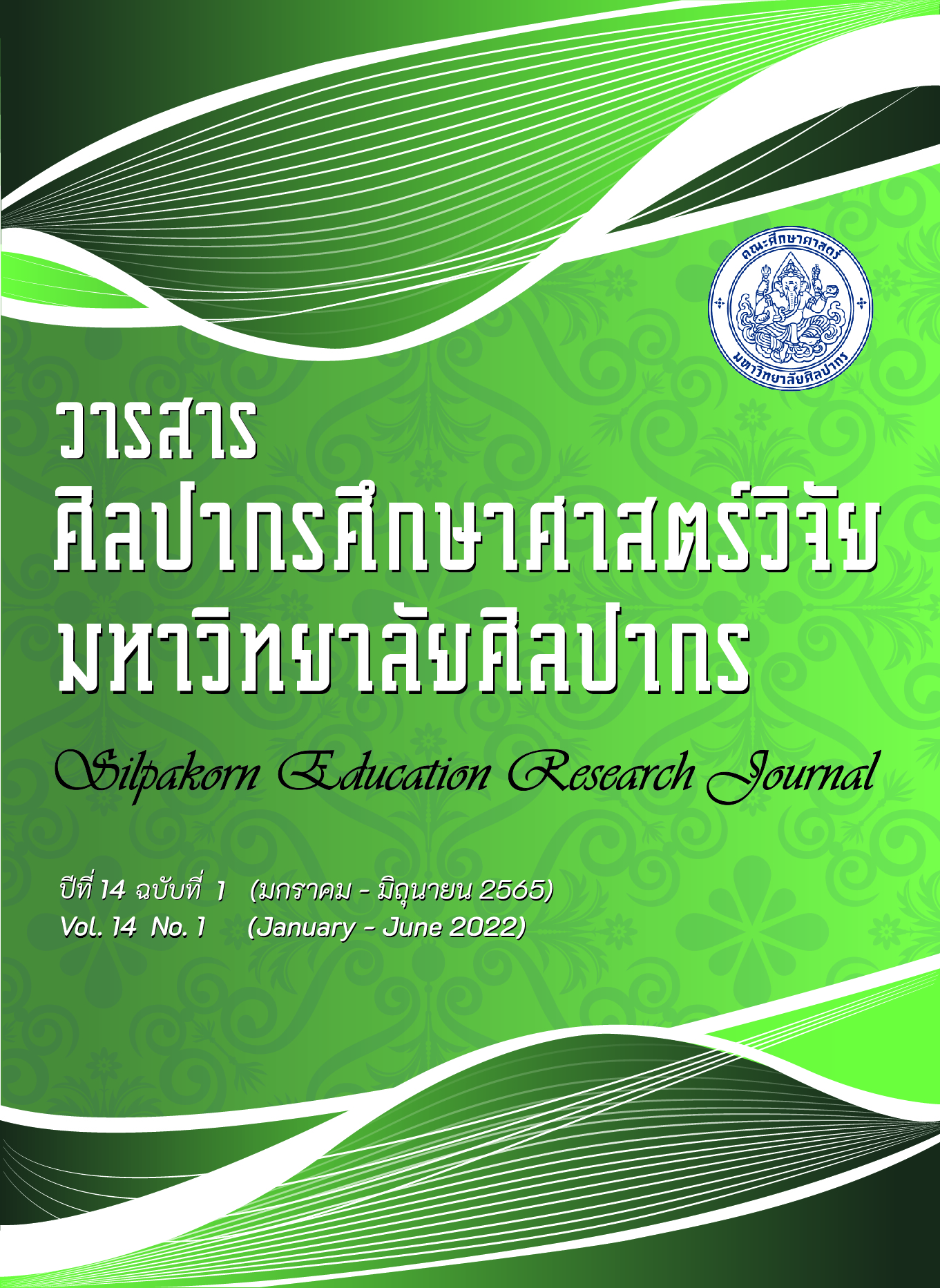การประเมินหลักสูตรปรัชญาดุษฎีบัณฑิต สาขาวิชาการบริหารการศึกษา (หลักสูตรปรับปรุง พ.ศ. 2561) คณะศึกษาศาสตร์ มหาวิทยาลัยศิลปากร
คำสำคัญ:
ประเมิน / หลักสูตรปรัชญาดุษฎีบัณฑิต / สาขาวิชาการบริหารการศึกษาบทคัดย่อ
การวิจัยครั้งนี้มีวัตถุประสงค์เพื่อประเมินหลักสูตรปรัชญาดุษฎีบัณฑิต สาขาวิชาการบริหารการศึกษา และเพื่อศึกษาความคาดหวังและข้อเสนอแนะเกี่ยวกับหลักสูตรปรัชญาดุษฎีบัณฑิต สาขาวิชาการบริหารการศึกษา โดยผู้วิจัยเก็บข้อมูลด้วยการสัมภาษณ์อาจารย์ประจำหลักสูตร และแบบสอบถามจากนักศึกษาในหลักสูตรและผู้บังคับบัญชาของนักศึกษา ตามกรอบแนวคิดในการประเมินหลักสูตรของ Stake (1967) ซึ่งประเมินหลักสูตรใน 3 ประเด็นหลักคือ ปัจจัยนำเข้า กระบวนการและผลลัพธ์ และทำการวิเคราะห์ข้อมูลด้วยความถี่ ร้อยละ ค่าเฉลี่ย ค่าส่วนเบี่ยงเบนมาตรฐานและการวิเคราะห์เนื้อหา
ผลการวิจัยพบว่า
- หลักสูตรปรัชญาดุษฎีบัณฑิต สาขาวิชาการบริหารการศึกษา ด้านปัจจัยนำเข้า ด้านกระบวนการ และด้านผลลัพธ์ มีความเหมาะสมในระดับมาก
- ความคาดหวังและข้อเสนอแนะเกี่ยวกับหลักสูตรปรัชญาดุษฎีบัณฑิต สาขาวิชาการบริหารการศึกษา ได้แก่ เพิ่มกิจกรรม/รายวิชาที่ทันสมัยช่วยเสริมความพร้อมให้นักศึกษาในการทำวิจัยและการเป็นดุษฎีบัณฑิต เพิ่มองค์ความรู้ที่ทันสมัยและแนวทางการประยุกต์ใช้ เพิ่มการพัฒนาบุคลิกภาพ เพิ่มกิจกรรมการสร้างความสัมพันธ์และกิจกรรมการแลกเปลี่ยนความรู้และประสบการณ์ระหว่างรุ่นพี่รุ่นน้องและอาจารย์อาวุโส พัฒนาทักษะการใช้เทคโนโลยีและการใช้ภาษาอังกฤษเพื่อการสื่อสาร
เอกสารอ้างอิง
External Stakeholders.” International Education Studies 8(12): 185-192.
Anannawee Paradee. (2015). “The Evaluation of Doctor of Philosophy Program Curriculum in
Educational Administration (Revised B.E.2554) Burapha University” SWU Educational Administration Journal 12(23): 98-107. (In Thai)
Imsawasd Prayoon. (2017). “The Satisfaction of the Employers towards the Work of Educational
Administration Postgraduates, Faculty of Education, Burapha University” Academic Services
Journal, Prince of Songkla University 28 (2): 72-84. (In Thai)
Lunenburg Fred C. and Allan C. Ornstein. (2012). Educational Administration: Concepts and
Practices, 6th ed. Belmont, CA : Wadsworth.
Nanthachai Suchada, et al. (2014).“The Evaluation of Doctoral Degree Program in Educational
Administration, Department of Education, Faculty of Education at Kasetsart University”
The Golden Teak: Humanities and Social Science Journal 15(2) 91-103. (In Thai)
Patterson Judith, Jiang Binbin, Chandler Mary and Chan Tak Cheung. (2012). “Educational
Leadership Program Effectiveness: Evaluation from Graduates and their Principals.”
Georgia Educational Researcher 9(1): 38-60.
Petchroj Laddawan. (2019) Evaluation of Curriculum in Master of Education Program in Educational
Administration Rajapruk University Using CIPPIEST Model” Journal of Humanities and
Social Sciences, Rajapruk University 5(2): 18-36. (In Thai)
Ringler Marjorie C. and William Rouse. (2007).“Evaluation of a Doctoral Program in Educational
Leadership.” National Council of Professors of Education Administration. Retrieved
15/7/2021 from Evaluation of a Doctoral Program in Educational Leadership (cnx.org)
Stake, Robert E. (1967). “The Countenance of Educational Evaluation” Teachers college Record 68:
523-540.
Wangthanomsak Mattana. (2017). “The Evaluation of the Ph.D. Curriculum in Educational
Administration (revised 2556 B.E.)” Veridian E-Journal ฉบับ International Humanities,
Social Science and Arts 10(4): 348-361.





